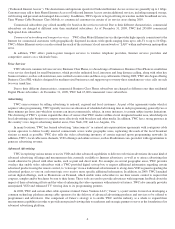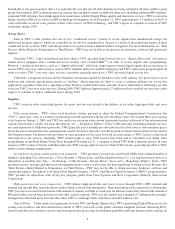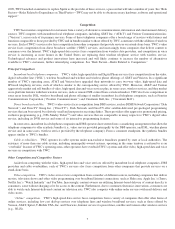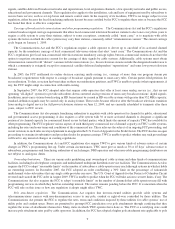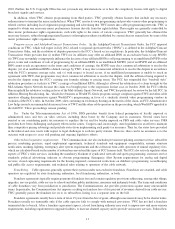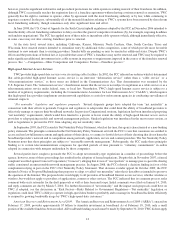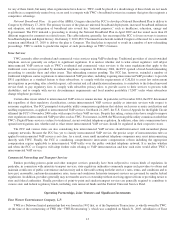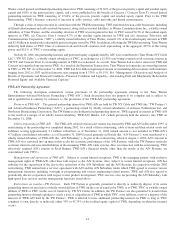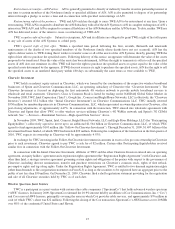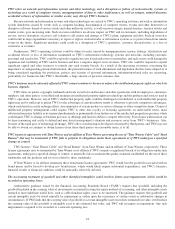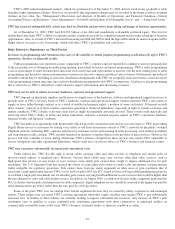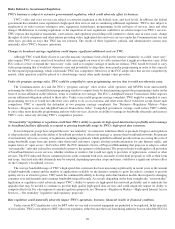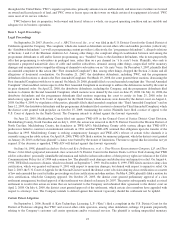Time Warner Cable 2009 Annual Report Download - page 25
Download and view the complete annual report
Please find page 25 of the 2009 Time Warner Cable annual report below. You can navigate through the pages in the report by either clicking on the pages listed below, or by using the keyword search tool below to find specific information within the annual report.for any of these funds, but many other organizations have done so. TWC could be placed at a disadvantage if these funds are not made
available in a competitively neutral way, or are used to compete with TWC’s broadband services in a manner that gives the recipients a
competitive advantage.
National Broadband Plan. As part of the ARRA, Congress directed the FCC to develop a National Broadband Plan to deliver to
Congress by February 17, 2010. The primary focuses of the plan are universal broadband deployment, increased broadband utilization
and adoption, and the integration of broadband into several key “national purposes,” such as healthcare, education, energy and
E-government. The FCC initiated a proceeding to develop the National Broadband Plan in April 2009 and has issued more than 28
different requests for comment on related issues. The cable industry, generally, has encouraged the FCC to focus on ways to increase
broadband adoption and digital literacy. On January 7, 2010, FCC Chairman Genachowski notified Congress of the need for a one month
extension until March 17, 2010 to deliver the plan to Congress. The final plan is expected to result in a number of new rulemaking
proceedings. TWC is unable to predict the impact of such proceedings on TWC’s business.
Voice Services
TWC currently offers residential and commercial voice services using VoIP technology. Traditional providers of circuit-switched
telephone services generally are subject to significant regulation. It is unclear whether and to what extent regulators will subject
interconnected VoIP services such as TWC’s residential and commercial voice services to the same regulations that apply to the
traditional voice services provided by incumbent telephone companies. In February 2004, the FCC opened a broad-based rulemaking
proceeding to consider these and other issues. That rulemaking remains pending. The FCC has, however, extended a number of
traditional telephone carrier regulations to interconnected VoIP providers, including requiring interconnected VoIP providers: to provide
E911 capabilities as a standard feature to their subscribers; to comply with the requirements of CALEA to assist law enforcement
investigations in providing, after a lawful request, call content and call identification information; to contribute to the federal universal
service fund; to pay regulatory fees; to comply with subscriber privacy rules; to provide access to their services to persons with
disabilities; and to comply with service discontinuance requirements and local number portability (“LNP”) rules when subscribers
change telephone providers.
Certain other issues related to interconnected VoIP services remain unclear. In particular, in November 2004, the FCC determined
that regardless of their regulatory classification, certain interconnected VoIP services qualify as interstate services with respect to
economic regulation. The FCC preempted state public utility commission regulations that address such issues as entry certification and
tariffing requirements, as applied to interconnected VoIP services. On March 21, 2007, the U.S. Court of Appeals for the Eighth Circuit
affirmed the FCC’s November 2004 order with respect to these VoIP services. Despite this ruling, certain states have sought to impose
state regulation on interconnected VoIP providers such as TWC. For instance, in 2008, the Wisconsin public utility commission ruled that
TWC’s Digital Phone service is subject to traditional, circuit-switched telephone regulation. In addition, other state commissions have
opened investigations into whether and to what extent interconnected VoIP services should be regulated in their respective states.
The FCC and various states are also considering how interconnected VoIP services should interconnect with incumbent phone
company networks. Because the FCC has yet to classify interconnected VoIP service, the precise scope of interconnection rules as
applied to interconnected VoIP service is not clear. As a result, some small incumbent telephone companies may resist interconnecting
directly with TWC. Finally, the FCC is considering comprehensive intercarrier compensation reform including the appropriate
compensation regime applicable to interconnected VoIP traffic over the public switched telephone network. It is unclear whether
and when the FCC or Congress will adopt further rules relating to VoIP interconnection and how such rules would affect TWC’s
interconnected VoIP service.
Commercial Networking and Transport Services
Entities providing point-to-point and other transport services generally have been subjected to various kinds of regulation. In
particular, in connection with intrastate transport services, state regulatory authorities commonly require such providers to obtain and
maintain certificates of public convenience and necessity and to file tariffs setting forth the service’s rates, terms, and conditions and to
have just, reasonable, and non-discriminatory rates, terms and conditions. Interstate transport services are governed by similar federal
regulations. In addition, providers generally may not transfer assets or ownership without receiving approval from or providing notice to
state and federal authorities. Finally, providers of point-to-point and similar transport services are generally required to contribute to
various state and federal regulatory funds, including state universal funds and the Federal Universal Service Fund.
Operating Partnerships, Joint Ventures and Significant Investments
Time Warner Entertainment Company, L.P.
TWE is a Delaware limited partnership that was formed in 1992 that, as of the Separation Transactions, is wholly owned by TWC.
At the time of the restructuring of TWE (the “TWE Restructuring”), which was completed on March 31, 2003, subsidiaries of Time
13



